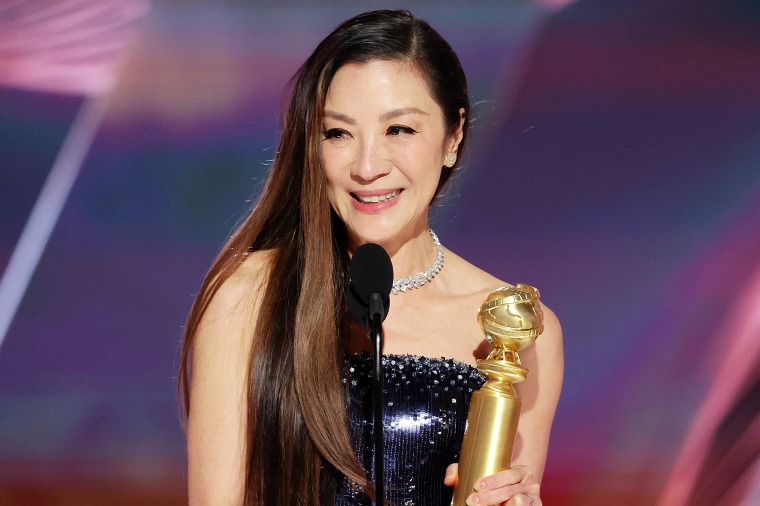Caroline Jeon said she was pleasantly shocked when on Tuesday Michelle Yeoh, who took home the Golden Globe award for best actress, ordered the exit music to stop playing after it interrupted her speech.
“Shut up, please. I can beat you up, OK? And I’m serious,” Yeoh laughed, before continuing.
Jeon, a 26-year-old Korean American based in New York City, said she’s used to seeing “older white male actors” defiantly run out the clock onstage. Yeoh's moment was refreshing for Jeon, a self-proclaimed assertive Asian American woman.
“For her to be confident but also playful about it … it’s reassuring and encouraging and mostly affirming for me to see,” Jeon said.
Host Jerrod Carmichael clarified during the ceremony that the exit music came from a pre-recorded track, rather than from live pianist Chloe Flowers, who performed TV and movie theme songs as the show transitioned to commercial breaks.
The moment immediately went viral. And for Asian women, who contend with historical pressures from within the community and beyond to make themselves small, Yeoh’s quip had a deeper meaning.
“We saw Michelle Yeoh take up space and insist on using her voice,” said Catherine Ceniza Choy, author of “Asian American Histories of the United States.” “We have to live with these stereotypes and expectations of being demure and diminutive on the daily. So to witness that on such a big stage of something like the Golden Globes was profound.”
Yeoh — who during her speech opened up about the racism she witnessed in her early days in Hollywood, as well as the dwindling opportunities for aging actresses — represents Asian women across a spectrum of personalities, said Nadia Kim, professor of sociology and Asian and Asian American studies at Loyola Marymount University. With her use of humor, Yeoh appealed to those who are more reserved by reflecting an elegance, Kim said. She simultaneously represented other Asian women who are more compelled to speak their minds.
Jeon, for example, said that she has often been reminded by loved ones to tone down her personality in spaces within the Asian American community. And in professional networking situations that are dominated by white peers, she said she is conscious of the judgment she may get as the “loud Asian girl.” But Yeoh appears to masterfully move through the world.
“Even though she has that fiery ... side of her that we’ve seen in films and also in instances like this, she still has that quiet, regal elegance,” Jeon said. “She navigates those two sides of her persona befitting the situation.”
Kim added that the humorous clapback is also meaningful in the context of women of color often being told to be content and thankful for what they have. Yeoh, she said, recognized what she deserved and did not allow for the moment to be robbed from her.
“There is that ‘you should be a grateful minority’ trope that people expect, especially in a realm which is mostly white. At the end of the day, most roles go mostly to white actors,” Kim said. “She was dignified throughout a career in which she was denied opportunities. And really, her career has exploded more recently in mainstream Hollywood. And that’s something she’s acknowledged.”
Yeoh’s “I could beat you up” statement, experts added, wasn’t so much a physical threat as it was an unconstrained recognition of her own martial arts skills. While many women are taught to downplay their strengths, particularly in front of men, Yeoh flexed her might in those five words.
Yeoh’s refusal to get off the stage also wasn’t just about making a personal statement herself — she wanted her message on behalf of the community to be heard. By sharing stories about painful brushes with racism in Hollywood like being asked if she spoke English, Yeoh was giving the audience a glimpse of the realities of those in the racial group.
“This was such a rare moment that they were playing exit music on. I think she was acknowledging it, not just for her, but for all Asian and Asian American or Asian diasporic actors,” said Kim, who called Yeoh’s speech “extremely political.” “How often have we seen a lead actress or actor award go to someone who looks like her?”
Indeed, Yeoh’s last words onstage paid homage to those of Asian descent.
“This is also for all the shoulders that I stand on, all who came before me, who look like me and all who are going on this journey with me forward,” Yeoh said in her speech. “So thank you for believing in us, thank you so much.”
